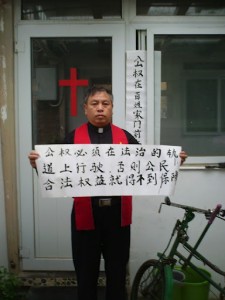China’s secret police are suspected of involvement in an attack on a Beijing pastor last month.

An unidentified man in a black SUV with covered license plates chased Liu Fenggang, a Beijing house church pastor who has served two prison terms for defending other Christians’ rights, and smashed his car windshield on Oct. 17, according to advocacy group China Aid.
Asked if secret police could be behind the attack, the Rev. Bob Fu, president of China Aid, said “Absolutely.”
“There is no doubt that secret police attacked Pastor Fenggang,” Fu told Morning Star News. “There is also precedent of him being attacked by them several times in the past.”
Liu was attacked as he was driving on the Beijing-Harbin highway with two other Christians, according to Chinese sources reporting to the Texas-based China Aid.
The assailant, described as tall, wearing a baseball cap and carrying a gold-colored metal club, bashed the windshield of the pastor’s car without provocation. The 53-year-old Liu, who has a history of diabetes, hypertension and myocardial infarction among other illnesses, sustained a few cuts on his arm from the shattered glass, according to China Aid.
Liu has declined to file a complaint as policemen in the Xisanqi area of Haidian District, in the suburbs of Beijing where the pastor lives, recently verbally abused him and put him under a kind of unofficial house arrest, China Aid reports.
The assault took place near a toll booth in Xianghe in neighboring Hebei Province as Liu was returning from Tangshan, Hebei, to Beijing. The pastor had gone to Tangshan with another Christian and his wife on personal business.
China Aid’s sources said that the pastor passed through the toll booth, he saw a metal fence across the road, which police often erect when setting up a check post. But there were no policemen. The fence forced Liu to pull into a single-lane road, and after he had driven for about three miles, the black SUV came from behind and began to crowd his car from the left, forcing him to stop.
The SUV also stopped. After a while, the pastor tried to pull out to the right. The SUV again blocked his car. As Liu opened his door to get out, his wife advised against it as she pointed out that the SUV’s license plate was covered with black cloth.
The man burst out of the SUV, ran toward the pastor’s car and yanked open his door – then slammed it shut as Liu was unbuckling his seatbelt. The assailant smashed the windshield with a club, hurried back to his vehicle and sped off.
China Aid reported the attack came less than four months after plainclothes police broke into the pastor’s house and warned him against leaving home without informing the local police station.
On the night of June 5, days after Liu returned from a visit to China’s border with Burma (also known as Myanmar) to help Christian Kachin war refugees, six officers including the chief of the local police station questioned Liu about why he had not advised them that he had left, China Aid reported. Police Chief Nie Jianguo was said to have verbally abused the pastor.
“Damn you for believing Christianity!” the police chief told him, according to China Aid. “So many people live in Xisanqi area, why are we monitoring you alone? You know it clearly. You stinky ***!”
The officers did not show their identity cards to the pastor’s family, China Aid reported.
Liu was arrested in October 2003 and sentenced to three years in August 2004 for “providing national intelligence to overseas organizations” by reporting a house church destruction case to overseas Christian organizations. He was hospitalized five times for serious heart disease and diabetes while serving the jail term.
In 1995, the pastor had been sentenced to two years in a labor camp for his work among house churches.
Unofficial churches, those operating outside the official Protestant Three-Self Patriotic Movement (TSPM) and Catholic Patriotic Association, are burgeoning throughout China. The number of Protestants belonging to house churches in China is estimated at between 45 and 60 million. Another 18 million to 30 million people attend government-approved churches, and some estimates of the total number of Christians in China range up to 130 million.
Chinese authorities restrict rights of churches if they grow in size or their clergy take part in any form of activism. Christians in unregistered churches object to TSPM controls and teachings, and they fear revealing their names and addresses could lead to abuses.
The People’s Republic of China, led by the Communist Party, does not allow citizens to form any association without government control. Various reports show Beijing fears the house church movement could pose a threat to the government. — Morningstar News



